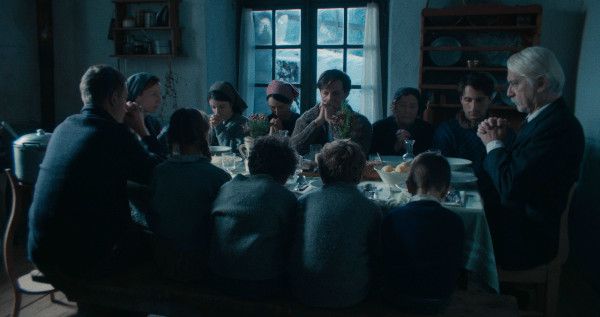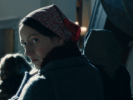Eye For Film >> Movies >> Vermiglio (2024) Film Review
Vermiglio
Reviewed by: Jennie Kermode

Sometimes, when she doesn’t think that anyone else will notice, Lucia (Martina Scrinzi) goes behind the wardrobe.
It isn’t exactly behind the wardrobe, that space that she and her sisters refer to as such, but, rather, the little gap which, when one of the wardrobe doors is open, becomes a hidden, enclosed space, a space where one might do forbidden things or think forbidden thoughts. There is a sense in Vermiglio – the film and the little Alpine village that is its setting – that any degree of privacy, any separation of oneself from the community, is innately sinful. The community has rules, has ways of doing things that enable everybody to survive in what is, in winter, a very harsh environment. A woman cannot refuse her husband’s advances, even if she has seven children already and is afraid that the next miscarriage will kill her. A man cannot have two wives, even if they stand close together. A child cannot expect to graduate from school if he was clearly made for field work.

This is the way that the rules have shaped life for as long as anybody can remember. But far away from these steep mountain slopes, something has changed. A war has been fought between multiple nations, using weapons never seen before. Men who went away to fight in the war have come back changed. There’s something indescribably different about them, and they won’t discuss why. The same might be said of the Sicilian deserter, Pietro (Giuseppe De Domenico), who has washed up there. With winter closing in and nobody actually willing to take a stranger into their home, they put him in the hay barn, give him food and fuel enough for a small fire. When he and Lucia set eyes on each other, a different kind of fire will start to burn.
Oscar-shortlisted and nominated for a Golden Globe, Maura Delpero’s multi-layered drama sees its heroine growing up and coming to understand the world in new ways at the same time as the village itself shifts, not altogether willingly, into the modern era. We spend a year there, watching it change with the seasons, from one set of snows to another.
Delpero doesn’t really introduce her characters but lets us into their midst as if we too had always been there, in the close-packed houses where every item has a purpose, in the bedrooms where children are crowded together with barely room to move, in the kitchens where they dunk bread in hot milk each morning to prepare for the work that lies ahead. In the small schoolhouse the daily routine begins with prayer and exercise. Elsewhere, women exchange the latest news as they work, always physical, always hard, though many have bodies that look broken. Then men are less present. They come into focus when making decisions or passing judgement. There is kindness, but it is always tempered by a focus on survival.
Whatever Lucia feels, it’s different. Could she build a different life? The older women discuss change in the abstract but never go do far as to imagine it for themselves. The marriage bed waits with promises of joy yet resembles an executioner’s block. Lucia’s sister Ada (Rachele Potrich), denied the opportunity to go to college, seeks another way out. Pietro seems to embody the promise of a place far away by the sea, where it is always warm, but it scarcely seems possible that anyone will reach it.
Delpero drew on her own family’s stories when making the film, and this gives it not only richness but finity. It is bordered by the mountain peaks and the opening and closing credits, by the overarching sky and by thwarted ambition. Mikhail Krichman’s photography is luminous and intimate. here, at the roof of the world, we might look out across many things, but we must bend our backs to duck beneath the beams of creation.
Reviewed on: 27 Dec 2024














